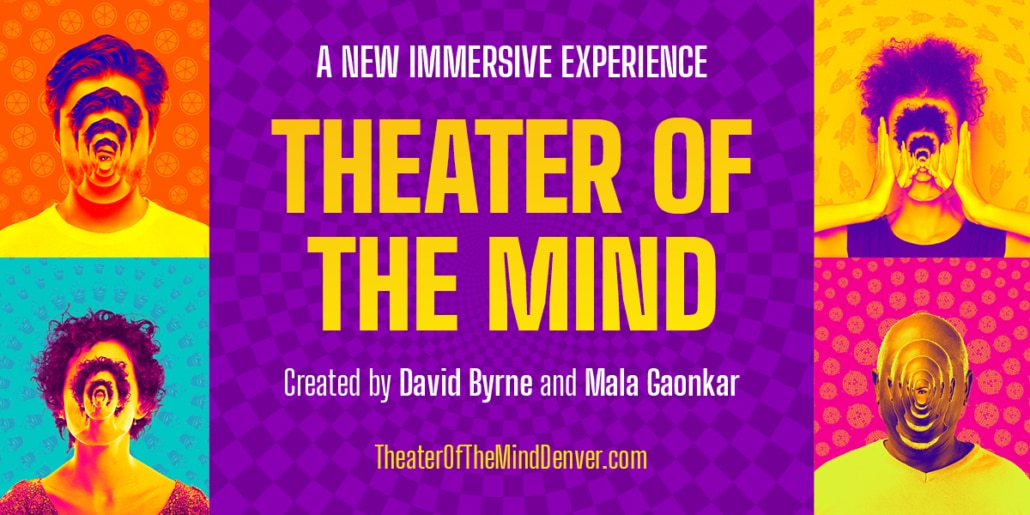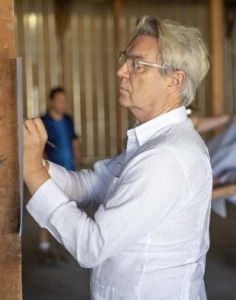DCPA NEWS CENTER
Enjoy the best stories and perspectives from the theatre world today.
Enjoy the best stories and perspectives from the theatre world today.

This is the question that multi-media artist, David Byrne (American Utopia, Talking Heads, Reasons to Be Cheerful, A History of the World in Dingbats) posed to me. Byrne has been asking this question for decades. In his early 20s he found himself fascinated with the work of neurophysiologist Warren McCulloch and thus began a journey that led him, 40 years later, to co-writer Mala Gaonkar, and their creation, Theater of the Mind.

Some of the creative team for Off-Center’s ‘Theater of the Mind,’ created by David Byrne and Mala Gaonkar. Photo by Adams VisCom.
Theater of the Mind is the newest, and arguably most ambitious, production of DCPA Off-Center. It doesn’t just explore the human brain; it allows YOU to explore YOUR brain through story and science. As a scientist who loves storytelling, it is like nothing I have ever seen or experienced.
Andrew Scoville, the show’s director, feels the same way. He grinned when I shared this, and in excitement told me “I am a storyteller who loves science!” Scoville, in addition to loving science, loves a challenge. As the architect of the process that gives Theater of the Mind its framework, he knew it was going to be “a challenge in the most positive way.” In effect, Scoville and the team set out to create a world of lived experiences, memories and self-reflection, in which the rest of us are then invited to play.
It is immersive art on a most massive scale. It has inner technological workings that are beyond belief. If that weren’t courageous enough, the experience is built upon the fallacy of human perception. It is designed to unlock the cage of the mind. No small potatoes here. Theater of the Mind aims to play big. To do so, the creative team tackled three aspects unique only to this type of production.

David Byrne was part of the ‘Theater of the Mind’ scouting team in Denver. Photo by Adams VisCom.
The first was the casting of unicorns, 14 of them to be exact. Not only are the actors in the production exceptional at their trade, but as Scoville relayed to me, “We didn’t just need actors, we needed conversationalists! People who could tell a story and confidently put you at ease.” But that wasn’t all Scoville was looking for, he also needed them to facilitate actual experiments and navigate each group of 16 from beginning to end. No small task, but they did it.
Next up, the team needed to set the stage, figuratively and immediately, for the show’s entry point. Guests would need to be in the right frame of mind in order to get the most of the experience. This is because audience members become part of the narrative. I don’t want to give too much away, so all I can say is that the creative team has clever ways of centering audience members in the story and challenging their sense of identity. Neuroscience supports this move.
Here’s why: your memories are malleable, and greatly influenced by emotion and sensory perception. Both are key parts of your nervous system, sending clues to your brain about what is going on around you and how you should feel about it. But you can’t take in everything, you simply don’t have the short-term memory space. Your brain needs to be selective. All that incoming data is filtered to capture only what is essential in that moment. The result? A very malleable and often unreliable memory. In fact, layers upon layers of these memories, tied to emotions, tied to your senses. All dictating your every move, your views, thoughts and your very identity.
This is how your mind creates the stories of you. This is perception.
Back to Theater of the Mind’s starting point, you find that all those perceptions and preconceived notions are shed when see yourself differently. It is quite liberating really. Think about it, when else are you given permission, in fact encouraged, to let your fixed identity go and see the world anew? This is how you begin your journey, which leads me to the final aspect.

Charlie Miller, DCPA Off-Center Executive Director & Curator and Producer of Theater of the Mind
The team needs your complete buy-in. You meet your guide, a shade of sorts, who weaves you into the very center of their story. You will experience their memories as seen through the eyes of their death, as they attempt to square up truth in order to understand who they truly are. For this to work, you need a space that shakes up your pattern recognition, a key feature of perception.
Pattern recognition is the experience of similar events, over and over, such that your brain recognizes and reacts with increasing speed, creating an automatic behavior. Quick action in the face of a threat leads to survival in the traditional sense. Pattern recognition in the face of true danger is imperative. But I wonder how these automatic habits play out in your everyday life. Might you have some automatic behaviors that are rooted in fear, or shame, maybe guilt or conditioning? Theater of the Mind aims to quiet these automatic brain patterns. It creates a space where you are asked to free yourself from filtering pattern recognition through your personal lens. It offers playful and mind-blowing experiments in which to test this out, and in the end, it seeks to engage you with a new way of thinking. It allows you to explore what it means to experience yourself in the world without the same fixed perspective.
This brings us back to Byrne’s original question, “If you are made of your memories, and those memories are malleable, then who are you?” In my interview with Off-Center’s curator and co-founder, Charlie Miller, he put it another way, “If memory and identity are malleable, meaning nothing is fixed, what else is possible?” A curious question I look forward to exploring.
Dr. Nicole Garneau is a geneticist and neuroscientist who speaks, consults and writes about the human experience in order to shatter the shame of mental health. Connect with Dr. Nicole at www.drnicolegarneau.com and @DocGarneau.
DETAILS
Theater of the Mind
Aug 31-Dec 18 • York Street Yards
Tickets
